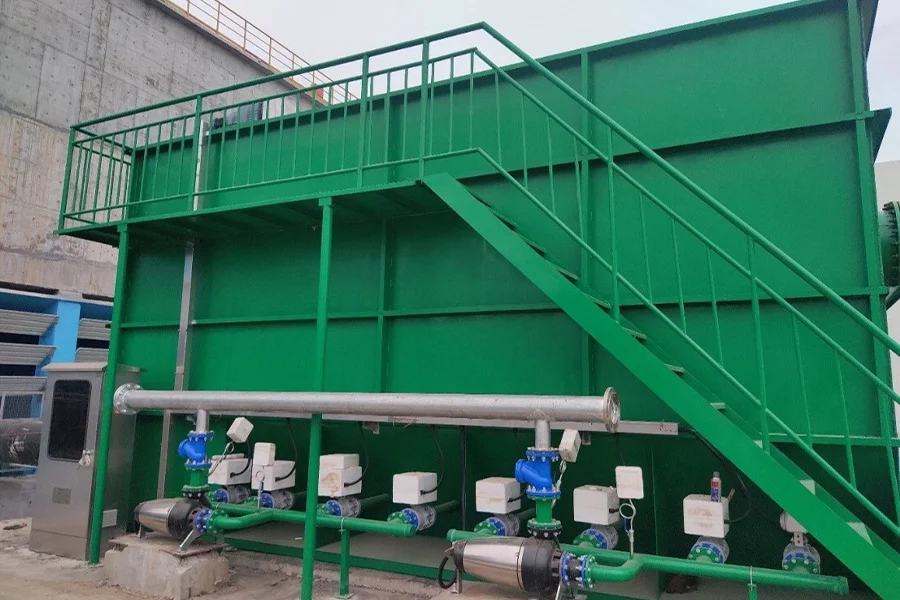With the development of the papermaking industry and the continuous improvement of paper quality standards, the optimization and management of industrial circulating water systems have become a critical component of production. Water is an indispensable production medium in the papermaking process, and a large amount of process water needs to be recycled to reduce production costs and environmental emissions. However, circulating water often contains fiber fragments, filler particles, and other impurities. These substances not only affect the surface quality of the paper but can also cause equipment blockage and reduce production efficiency. Industrial circulating water filtration systems have emerged as a crucial component to ensure efficient and safe production in papermaking companies.
1. The Role of Industrial Circulating Water Filtration Systems in the Papermaking Industry
Removing Fiber Fragments and Fillers: During the papermaking process, fibers from the slurry enter the circulating water system along with the process water. If not removed promptly, these fiber fragments can accumulate on pipes, pump stations, and heat exchanger surfaces, forming blockages and deposits. Filtration systems effectively capture fiber and filler particles in the water through mechanical filtration, cyclone separation, or mesh filtration, ensuring clean circulating water and safeguarding paper production quality from the source. Improving paper surface quality: Residual impurities in circulating water can cause surface spots, fiber clumps, or filler deposits during paper production, directly impacting the smoothness, uniformity, and printability of the finished paper. Using a circulating water filtration system effectively improves water quality, resulting in a more uniform and smooth paper surface, and enhancing the paper's physical properties and printability.
Preventing equipment clogging and reducing maintenance costs: In paper mills, pumps, pipes, heat exchangers, and dewatering equipment are constantly exposed to circulating water. Excessive fiber and filler in the water can lead to clogging, increased wear, and increased downtime and maintenance costs. Industrial circulating water filtration systems can continuously maintain clean water quality, extend equipment life, reduce maintenance costs, and enhance production continuity.
Water conservation and environmental protection: Modern papermaking companies face the dual pressures of water conservation and emission control. Circulating water filtration systems can increase the reuse rate of process water, reduce fresh water usage, and reduce wastewater discharge, thus complying with green production concepts and environmental protection requirements.

2. Main Types of Filtration Systems
In the papermaking industry, based on water treatment requirements and circulating water characteristics, commonly used filtration systems include the following:
Mechanical Filtration Systems: Mechanical filtration primarily uses mesh or screens to trap particles in the water. Screen filters commonly used in paper mills can be selected with varying pore sizes based on fiber and filler particle size, effectively removing most suspended solids. Mechanical filtration is simple to operate and maintain, making it suitable for initial treatment of circulating water.
Cyclone Separation Filtration Systems: Cyclone separation utilizes centrifugal force to remove fibers and particles from the water, making it suitable for treating circulating water with high fiber and filler concentrations. Cyclone filters have no wearing parts and are wear-resistant, making them suitable for the continuous production environment of paper mills and effectively reducing equipment clogging.
Automatic Cleaning Filtration Systems: Automatic cleaning filtration systems, equipped with backwash or scraper cleaning devices, operate continuously, reducing manual maintenance. For large-scale paper production lines, these systems can maintain long-term stable water quality, ensuring paper quality and production efficiency.
Combined Filtration Systems: To meet the demands of high-standard paper production, papermakers often combine mechanical filtration, cyclone separation, and automatic cleaning filtration to achieve multi-stage filtration. Multi-stage filtration not only improves water treatment efficiency but also allows for flexible adjustment of water quality to meet the requirements of refined papermaking production.
3. Maintenance
Regularly inspect and clean filters: Based on the fiber content and filler concentration of the circulating water, regularly clean or replace the filter screen to prevent clogging and impacting water flow.
Monitor water quality parameters: Install an online water quality monitor to monitor the turbidity, suspended solids concentration, and impurity content of the circulating water in real time, allowing timely adjustment of filtration system operating parameters to maintain stable water quality.
Rationally design a multi-stage filtration system: Based on the varying water quality requirements of the papermaking process, a multi-stage filtration solution is implemented, with primary filtration removing large particles and fine filtration treating fine fibers and fillers, improving filtration efficiency and system stability.
Optimize automatic cleaning and backwash cycles: Automatic cleaning filtration systems should optimize backwash cycles based on water quality fluctuations and production load to ensure clean water while conserving water resources and energy.
Combining with chemical treatment: In cases with high filler concentrations or difficult-to-treat water sources, flocculants or auxiliary treatment agents can be used to improve filtration effectiveness, ensuring paper quality and equipment safety. Industrial circulating water filtration systems play an irreplaceable role in the papermaking industry. They not only effectively remove fiber debris and fillers from process water, ensuring paper quality, but also prevent equipment clogging, extend equipment life, and help companies achieve their water conservation and environmental goals. With the continuous advancement of technology in the papermaking industry, intelligent, efficient, and energy-saving circulating water filtration equipment will provide a vital guarantee for water treatment in the papermaking industry.
Through appropriate selection, scientific operation, and timely maintenance, papermaking companies can fully leverage the advantages of industrial circulating water filtration systems to achieve high-quality paper production and sustainable development, resulting in a win-win situation for both economic benefits and environmental benefits.
As a professional circulating water filtration system supplier, Jinhua has long been committed to providing efficient and reliable water treatment solutions for the papermaking, chemical, and steel industries. Leveraging advanced filtration technology and extensive industry experience, Jinhua is able to design customized filtration solutions for different process water qualities. We provide comprehensive services from selection and design, installation and commissioning, to operation and maintenance, helping companies achieve energy conservation and consumption reduction, improve production efficiency, and recycle water resources.
www.jinhuacn.com
jinhua
